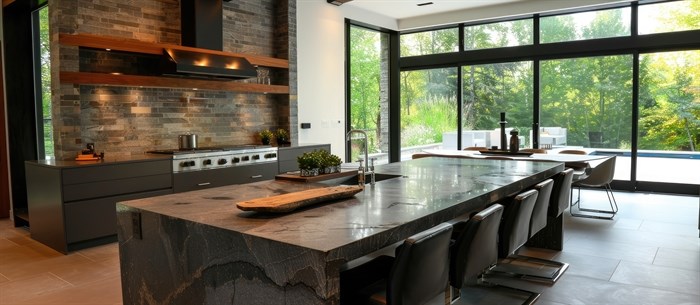
Various stone samples
Image Credit: Adobe Stock
May 06, 2024 - 8:00 AM
When it comes time to choose the surfaces that will define your kitchen and bathrooms, the debate between natural stone and Caesarstone countertops is one that homeowners, interior designers, and renovation enthusiasts continue to engage in. Both options boast several compelling features and benefits, but they also carry their own set of drawbacks. Here, we'll dissect the pros and cons of each, aiming to make your decision easier.
Natural Stone Countertops: Elegance Defined
Natural stone countertops, including granite, marble, and soapstone, have long been celebrated for their timeless beauty and unique characteristics. No two slabs are exactly alike, ensuring that your kitchen or bath will showcase a one-of-a-kind look.

Contemporary kitchen design featuring a countertop made from natural stone
Image Credit: Adobe Stock
Pros:
-
Aesthetics: The natural variations in colour and veining mean that you'll have a piece of earth’s history adding allure to your home.
-
Durability and Heat Resistance: These countertops are prepared to withstand the rigours of daily use, including heat, making them ideal for both kitchen and bathroom settings.
-
Home Value: Incorporating natural stone into your home is seen as a luxurious upgrade that can boost your property’s market value.
-
Longevity: With proper care, including regular sealing and polishing, natural stone can last a lifetime.
Cons:
-
Porosity: Some stones, like marble, are porous and can stain if not sealed properly.
-
Maintenance: Regular sealing is required to maintain their resistance to stains and damage.
-
Price: High-quality natural stone can be on the pricier side, making it a significant investment.
Caesarstone Countertops: Modern Marvels
On the other side of the spectrum lies Caesarstone, a brand synonymous with high-quality engineered quartz countertops. Offering a more uniform appearance and a vast palette of colours, Caesarstone brings contemporary elegance to home interiors.
Pros:
-
Uniformity: If you're looking for consistency in appearance without the surprises natural variations can bring, Caesarstone is your go-to.
-
Non-Porous Surface: Unlike natural stones, Caesarstone is non-porous, meaning it's virtually impervious to stains and doesn't require sealing.
-
Durability: Engineered to be robust, its surfaces are highly resistant to scratches, chips, and cracks, contributing to its low-maintenance appeal.
-
Customization: Caesarstone can be tailored to fit specific designs and spaces, offering a versatile solution for creative layouts.
Cons:
-
Heat Sensitivity: While durable, engineered quartz may be more susceptible to heat damage compared to some types of natural stone.
-
Costs: Depending on the style and complexity of the installation, Caesarstone can be comparable in price to natural stone, particularly for higher-end designs
-
Environmental Impact: Manufacturing engineered stone is energy-intensive, which may concern environmentally conscious homeowners.
Making the Choice
Determining whether natural stone or Caesarstone countertops reign supreme will ultimately depend on your personal preferences, lifestyle, and budget. For those who value uniqueness and the natural beauty of stone, and don't mind a bit of maintenance, natural stone could be the winner. Meanwhile, homeowners seeking consistency, ease of care, and modern aesthetics might lean towards Caesarstone.
Whatever your choice, both materials can add luxury, functionality, and appeal to the heart of your home. Remember to consider not only the initial cost but also the longevity and maintenance requirements of your chosen material over time.
At Arden Tile, we offer an extensive selection of tile, hardwood and vinyl flooring, mosaics, and stone in our Vernon, BC showroom
Sponsored By 
News from © iNFOTEL MULTIMEDIA, 2024